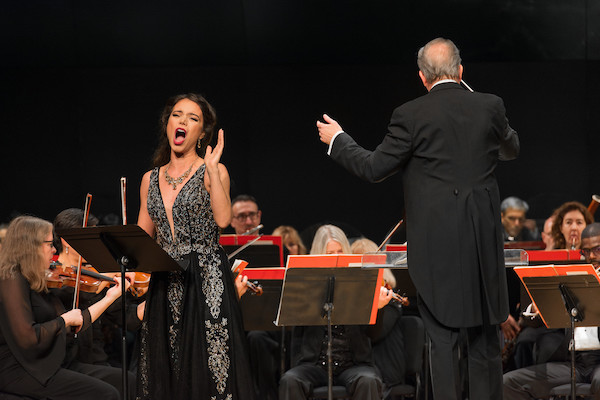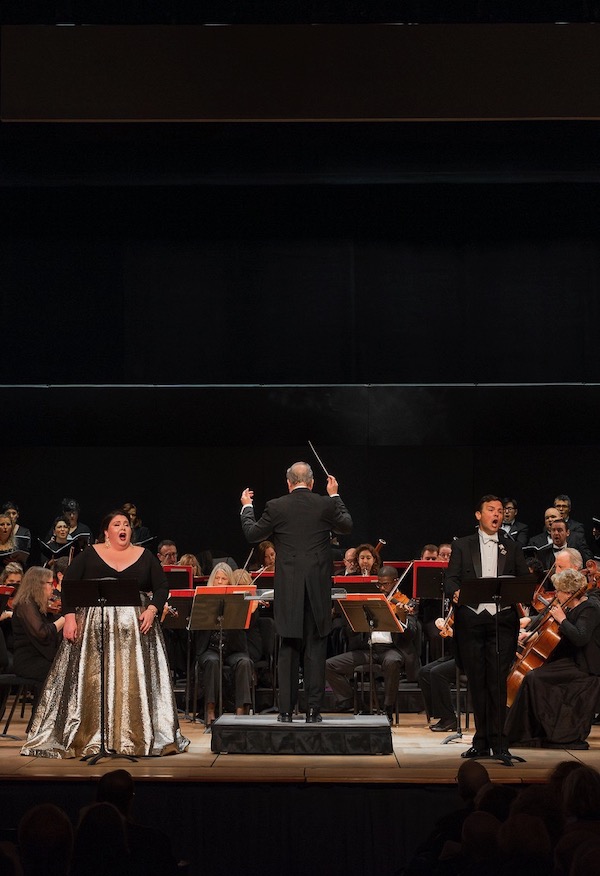Concert Opera revives Rossini’s rich “Ermione” in season highlight

Ginger Costa-Jackson sang the role of Andromaca with Antony Walker conducting Rossini’s Ermione for Washington Concert Opera. Photo: Caitlin Oldham
Washington Concert Opera opened its 37th season on Saturday night, performing yet another nearly unknown rarity from the 19th century. A capacity crowd at Lisner Auditorium heard the Washington area’s first performance of Gioachino Rossini’s opera seria Ermione. Premiered in Naples in 1819, when the composer was only 27, it was withdrawn in failure after seven performances but remained a favorite of Rossini’s.
Andrea Leone Tottola based his libretto on Racine’s tragedy Andromaque, itself derived from a play by Euripides and sections of Virgil’s Aeneid. Andromache, wife of the Trojan hero Hector, narrowly escapes the destruction of Troy with her son after Achilles slays her husband. They are taken prisoner by Pyrrhus, son of Achilles, who falls in love with her, angering Hermione, whom he has promised to marry. Orestes, son of Agamemnon, arrives seeking to kill Hector’s son and ends up causing the death of Pyrrhus in an attempt to rekindle his old passion with Hermione.
In other words, it is Greek mythology recast as soap opera: Rossini and his librettist shifted the focus from Andromache to the abandoned Hermione (thus the title change), creating one of the great examples of why you should never wrong a soprano. Angela Meade, who took up this bombastic role in 2015, has sung it in many places, including at the Teatro San Carlo in Naples, for the bicentenary of the opera’s first performance there.
Meade, who was recovering from an upper respiratory infection, was not in top vocal form, but she still gave a ferocious account of this blockbuster role. She brought depth of characterization to the opening duet with her betrothed, tempering her spiteful attitude with a softer side. At the conclusion of Act I she let loose an emotional, piercing high note, followed by a scowl, as if irritated that she had succumbed to any human feeling.
Meade negotiated Ermione’s showpieces in Act II with a little less of her customary ease of technique. Drawing together the strength she had held in reserve, the powerhouse soprano delivered a rousing interpretation of her part in the extensive Act II finale. At the end of the opera, Ermione only faints upon learning of the death of Pirro, a change from Racine’s play, where she takes her own life, sealing Andromache’s triumph ruling Epirus as queen.

Angela Meade in the title role and David Portillo as Pirro in WCO’s Ermione. Photo: Caitlin Oldham
Rossini created dueling tenor roles, both of them demanding, for the lead men. David Portillo’s imperious Pirro soared commandingly over the role’s extraordinary two-octave range. His dulcet tenor sweetened the slow pieces with mellifluous legato, which nearly overshadowed the authority of his spitfire accuracy in rapid figuration. At the end of the Act I duet with Meade, Portillo hit a soft high note, growing in volume with consummate control to a polished finish.
As his foil, the jealous Orestes, Lawrence Brownlee easily negotiated that role’s even higher range, which is one of his specialties, even moving with impressive accuracy in passagework up in the tenor stratosphere. The two tenors vied with one another musically in the marvelously constructed Act I finale, on twinned staccato lines over wide-ranging arpeggios.
As Andromaca, Ginger Costa-Jackson’s puissant mezzo fulminated in her striking opening scene, delivering a pleading cavatina to her imprisoned son, followed by a dramatic high note (“Tacete!”) and crystal-clear runs. She proved just as effective in her Act II duet with Pirro, at the end of which she and Portillo united on a searing high note, and the duet with Meade’s Ermione. Singing mostly from memory, Costa-Jackson moved freely about the stage in solo arias, lending the feel of a semi-staging.
Along with a sterling lead cast, conductor Antony Walker put together a fine roster of supporting singers, beginning with soprano Erin Ridge as Cleone, Ermione’s faithful attendant. Other voices familiar to local audiences also impressed in this decidedly treble-heavy opera, including mezzo-soprano Kate Jackman as Cefisa, tenor Matthew Hill as Pilade, tenor Rolando Sanz as Attalo, and bass-baritone Matthew Scollin as Fenicio.
Prepared by David Hanlon, the WCO chorus, in slightly reduced size, sang with precision and potency, especially the tenors and basses. One of the possible reasons that the opera did not succeed with the Neapolitan audience could be Rossini’s unconventional musical choices, eschewing secco recitative for orchestral accompaniment and often linking pieces into much longer numbers. The chorus, in particular, is woven into the action in more subtle, Gluckian ways, including its dramatic interventions during the overture, giving voice to the laments of the captive Trojans.
Walker led the performance with authority, marking a pliant beat that kept the orchestra on pace with the singers. (The parts for off-stage banda, left unspecified in the manuscript source, were played by the forces onstage.) With careful gestures, Walker made sure not to overwhelm the voices individually but elicited the orchestra’s full power to foster thrilling climaxes, especially in the two surprising finales. Rossini later called this neglected score his “little William Tell in Italian,” and it was a pleasure to have the chance to finally hear it live.
Ailyn Pérez and Mario Chang star in Puccini’s La Rondine 6 p.m. April 7, 2024, to mark the centenary of Puccini’s death. concertopera.org

Posted Dec 05, 2023 at 6:06 am by Robert Suslowicz
Great review of a wonderful opera and performance!